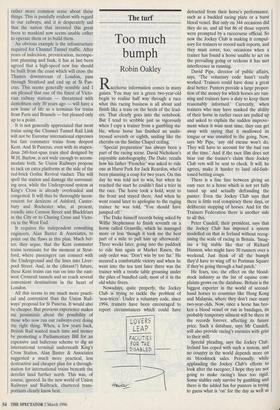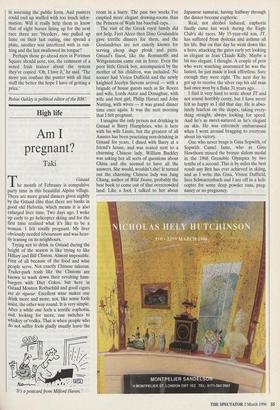The turf
Too much bumph
Robin Oakley
Racehorse information comes in many guises. You may see a green two-year-old begin to realise half way through a race what this racing business is all about and finish like a train on the heels of the lead- ers. That clearly goes into the notebook. But I tend to scribble just as vigorously when I espy a trainer from a gambling sta- ble, whose horse has finished an undis- tressed seventh or eighth, smiling like the cherubs on the Sistine Chapel ceiling.
`Special preparation' has always been a part of the racing scene. David Nicholson's enjoyable autobiography, The Duke, recalls how his father `Frenchie' was asked to ride one at Hurst Park for Jack Reardon, who'd been planning a coup for two years. On this day he was told not to win, but when he reached the start he couldn't find a trier in the race. The horse took a hold, went to the front and stayed there. And when he went round later to apologise to the raging trainer he was told, 'You should have jumped off.'
The Duke himself records being asked by Willie Stephenson to finish seventh on a horse called Granville, which he managed more or less 'though it took me the best part of a mile to pull him up afterwards'. Three weeks later, going into the paddock to ride him again at Market Rasen, the only order was: 'Don't win by too far.' He secured a comfortable victory and when he went into the tea tent later there was the trainer with a trestle table groaning under the piles of bundled cash, most of it in the old white fivers.
Nowadays, quite properly, the Jockey Club is trying to tackle the problem of `non-triers'. Under a voluntary code, since 1994, trainers have been encouraged to report circumstances which could have detracted from their horse's performance, such as a buckled racing plate or a burst blood vessel. But only on 344 occasions did they do so, and all but 86 of those reports were prompted by a racecourse official. So now the Jockey Club is making it compul- sory for trainers to record such reports, and they must cover, too, occasions when a trainer has found a horse unable to act on the prevailing going or reckons it has met interference in running.
David Pipe, director of public affairs, says, 'The voluntary code hasn't really worked. Trainers could have done a great deal better. Punters provide a large propor- tion of the money for which horses are run- ning and trainers have a duty to keep them reasonably informed.' Currently, when trainers who may have masked the ability of their horse in earlier races are pulled up and asked to explain the sudden improve- ment when it wins next time, they can get away with saying that it swallowed its tongue or was unsuited to the going. Now, says Mr Pipe, 'any old excuse won't do. They will have to account for the bad run at the time.' And if the race film does not bear out the trainer's claim then Jockey Club vets will be sent to check. It will, he agrees, make it harder to land old-fash- ioned betting coups.
There is a fine line between giving an easy race to a horse which is not yet fully tuned up and actually defrauding the punter. Even the Jockey Club says that there is little real conspiracy these days, or deliberate stopping of horses. And for the Trainers Federation there is another side to all this.
Peter Cundell, their president, says that the Jockey Club has imposed a system modelled on that in Ireland without recog- nising the scale of racing in Britain. 'Imag- ine a big stable like that of Richard Hannon, who might have 30 runners over a weekend. Just think of all the bumph they'd have to wing off to Portman Square if they're going through a bad patch.'
He fears, too, the effect on the blood- stock industry as the list of equine com- plaints grows on the database. Britain is the biggest exporter in the world of second- hand horses to countries like Hong Kong and Malaysia, where they don't race many two-year-olds. Now, once a horse has bro- ken a blood vessel or run in bandages, its probably temporary ailment will be there in the records forever, affecting its future price. Such a database, says Mr Cundell, will also provide racing's enemies with grist to their mill.
Special pleading, says the Jockey Club. Ireland has coped with such a system, and no country in the world depends more on its bloodstock sales. Personally, while applauding the Jockey Club's efforts to look after the racegoer, I hope they are not going to make racing's lines too rigid. Some stables only survive by gambling and there is the added fun for punters in trying to guess what is 'on' for the day as well as in assessing the public form. And punters could end up stuffed with too much infor- mation. Will it really help them to know that of eight horses lining up for the next race three are 'bleeders', two pulled up lame on their last outing, one spread a plate, another was interfered with in run- ning and the last swallowed its tongue?
Perhaps those go-ahead men in Portman Square should note, too, the comment of a noted Irish trainer about the system they've copied. 'Oh, I love it,' he said. 'The more you confuse the punter with all that stuff the better the hope I have of getting a price.'
Robin Oakley is political editor of the BBC.



































































 Previous page
Previous page